How to Include Scouting on Job or College Applications
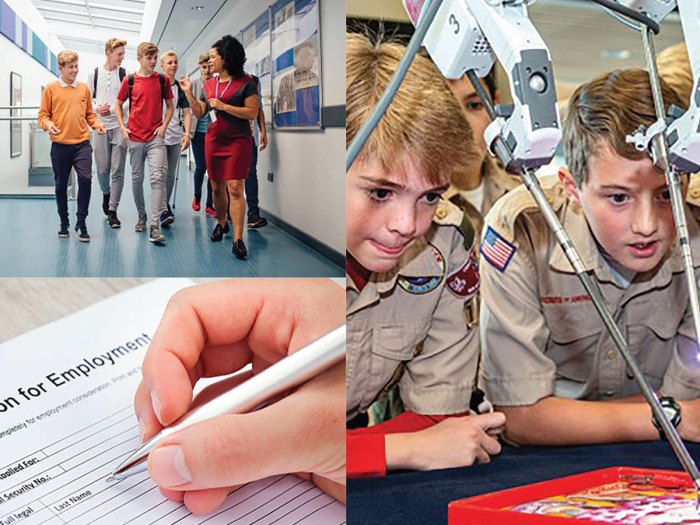
When it comes to your future, you should make the most of your Scouting experience. On an application for college or a job, it’s not enough to just list Scouting as one of a half-dozen bullet points on your résumé. You need to explain the significance of that experience and how it shaped you.
By elaborating about your awards, leadership opportunities, volunteer hours and hands-on activities, you bring your Scouting experience into sharp focus, which can move your application to the top of the pile.
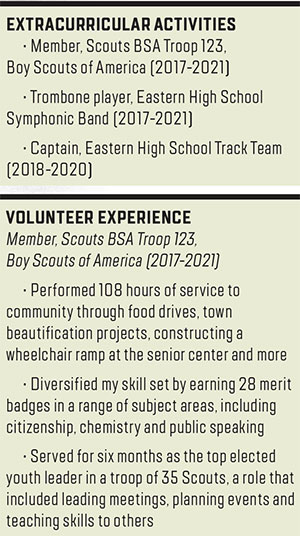
WHY CONTEXT MATTERS
So why not just list that you are an Eagle Scout or spent however many years in a pack, troop, ship or crew? Because colleges and employers want more than the “what.” They also want the “so what?”
Check out these excerpts from two fake-but-realistic résumés from the same Scout. Which reference to Scouting looks more impressive?
You know that years of Scouting means you completed service projects, earned merit badges and held leadership roles. But how would an application reader or hiring manager know that? You have to show them.
WHERE SHOULD YOU INCLUDE SCOUTING EXPERIENCE ON JOB APPLICATIONS?
• On your résumé: Under volunteer experience, include an overview of your Scouting accomplishments. If you worked a paid job — at summer camp, for example — list that separately.
• In your cover letter: Think of a memorable Scouting experience — one that helped solidify your leadership skills and shows your commitment to get the job done. Turn that into a short narrative that catches the hiring manager’s attention. Which of the following intros makes you want to read more?
Example 1: “I spent four years as a Scout in Troop 123. As senior patrol leader, I learned how to overcome setbacks, lead my peers and work in a productive team.”
Example 2: “Sunset was just an hour away, but that night’s campsite was still 10 miles down the trail. As the leader of this group of Scouts — someone elected to get the job done — I had a decision to make.”
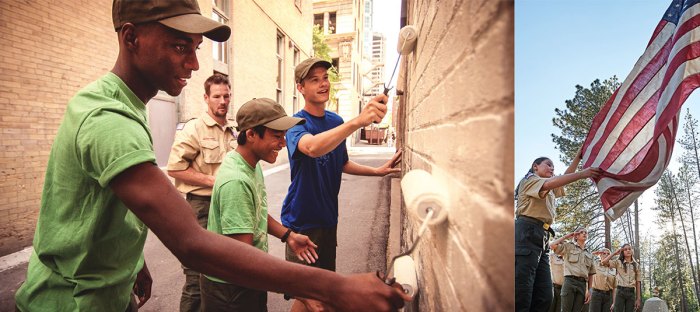
WHERE SHOULD YOU INCLUDE SCOUTING EXPERIENCE ON COLLEGE APPLICATIONS?
• In your application: Colleges say they look at everything you send — not just your GPA and test scores. This means you’ll want to include Scouting under sections like volunteer experience or extracurricular activities. If there’s space, include a few highlights.
• In your essay: Find the university’s mission statement. Which of its stated values align closest with Scouting values? In that overlap, you might find inspiration for your essay. If the university values innovation, talk about the time you invented a camp gadget using only the materials in your troop trailer. If it values leadership, write about how you led a group of Scouts on a 50-mile hike across rugged terrain.
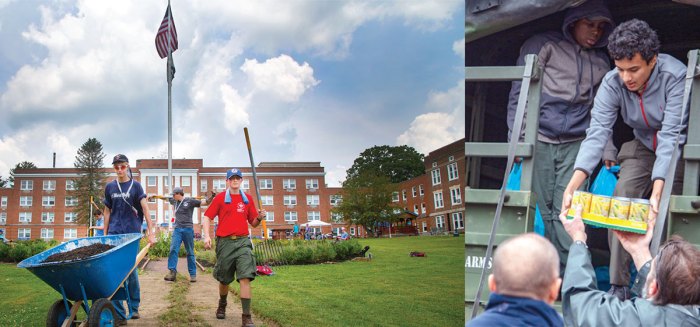
HOW TO SPOTLIGHT SERVICE PROJECTS
Eagle Scout service projects check so many boxes. They show that you can manage a multifaceted project, create a budget, lead others and commit yourself to something that takes months to complete. All that, plus the impact on the community.
If you’re an Eagle Scout, include your service project in your résumé or application. It also might form the backbone for a cover letter or admissions essay. If you aren’t an Eagle Scout, choose any memorable community service project. Describe how the project ignited a passion for selfless service.
These words can be more impactful when paired with numbers, so include how many hours of volunteer time you’ve given. Check out the “value of volunteer time” calculation at go.scoutlife.org/volunteertime. There, the nonprofit group Independent Sector determined that in mid-2021 each volunteer hour was worth $28.54 to the nation (the number regularly changes). If you’ve accumulated 100 hours of service in your Scouting career, that service is worth $2,854.

HOW TO DESCRIBE LEADERSHIP EXPERIENCE
Scouting is unique among extracurriculars because it’s truly led by youth. Make this as clear as possible by sharing how, as senior patrol leader or patrol leader, you planned an entire year of activities, including meetings, campouts and a weeklong canoeing trip.
On a job application, describe how, as quartermaster, you prepared a detailed inventory for $3,000 in troop camping equipment. Or tell in a college essay how, as troop historian, you conducted interviews and historical research to prepare a video celebrating your troop’s 100th anniversary.
HOW TO EXPLAIN MERIT BADGES
Employers want to hire people who have many talents and can adapt to changing needs of the workplace. Colleges want to admit students who demonstrate a range of skills and show a willingness to learn.
Every time you earn a merit badge, you gain skills in a subject area with real-world value. Share both the number of merit badges you earned and a few specific examples. If you earned one with a direct link to the job or university, include it for sure. For example, if you’re applying for an after-school job at a pet store and have earned the Pets merit badge, list it. If you’re hoping to major in anthropology and earned the American Cultures merit badge, be sure to say so.
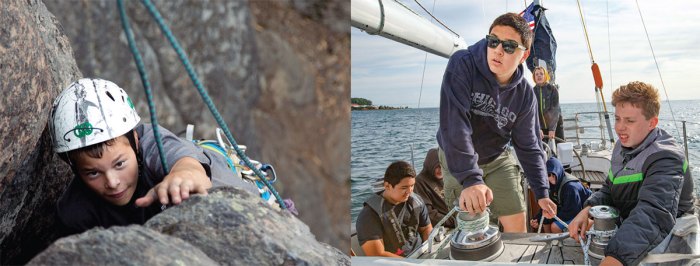
HOW TO INCLUDE HIGH-ADVENTURE EXPERIENCES
Scouting trips lasting a week or longer require months (or years) of planning, training and fundraising. So the story isn’t that you got to go kayaking in Alaska or hiking at Philmont. It’s about everything leading up to the trip. It’s about the hurdles you overcame along the way. It’s about how you came back changed forever.
THREE OTHER QUICK TIPS
• Don’t use jargon. Don’t assume everyone knows common Scouting terms like “merit badge,” “senior patrol leader” or “National Jamboree.” Briefly explain what they are.
• But don’t leave out Scouting keywords, either. This is important as some employers move to computerized résumé scanners that automatically organize and rate applicants. If you’re an Eagle Scout but only say that you “earned the highest award in the Boy Scouts of America,” the employer might overlook it completely.
• Plan for the interview. For a job or college interview, consider how your Scouting experience might be showcased verbally. Interviewers often use résumés to find icebreakers, and your time in Scouting might be what they choose. Be Prepared to tell your Scouting story by rehearsing it with friends or family.
Consider including mention under PROFESSIONAL AFFILIATIONS/MEMBERSHIPS (or similar) section similar to below:
PROFESSIONAL AFFILIATIONS / MEMBERSHIPS
National Eagle Scout Association, member OR
National Eagle Scout Association, Lifetime member (if applicable)